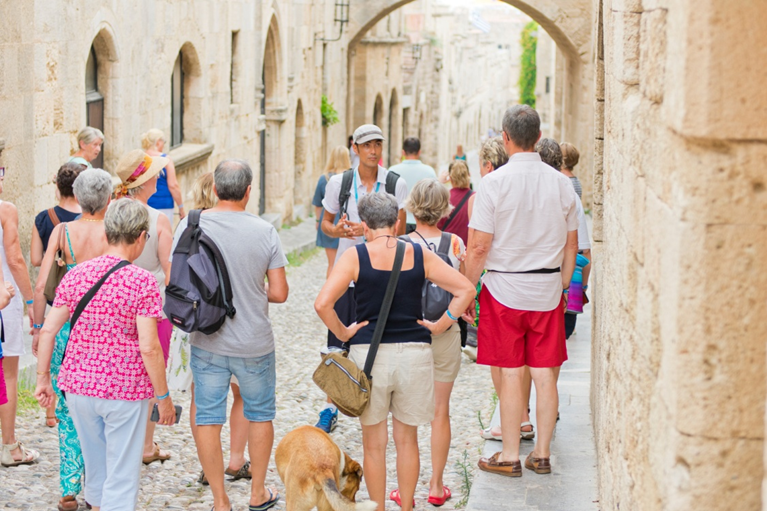News & Announcements
You are going on holidays towards an unknown or to a previously explored destination. But how can you be assured you have really visited the place, and have discovered all its secrets?
Whether you are rather a solo or a group adventurer, faithful to what’s written in your pocket travel guide or strolling and looking for surprises to happen; choosing a professional licensed local guide is one of the keys to a successful holiday.
Why is this choice the best one for any kind of traveler?
Here you’ll find 7 reasons to choose a professional certified tourist guide:

Adrien Bordrez guiding in the old town of Rhodes, Greece © FEG by Adrien Bordrez
- Quality: You get complete and accurate information. Any licensed local guide has been through official training for guides and is qualified. This local expert qualification is recognized by the local authorities. An official guide has been learning about various topics covering every aspect of local culture and life of an area, and respects criteria about the quality of guiding and the accuracy of the information he is passing on.
- Authenticity: What better than a local to give you the best tips and addresses! Local guides live and regularly visit the place where they work and can therefore become the perfect entry gate to discover the local culture and people. He will easily recommend the best places to see, eat, go out, etc.
- Adaptability: Being a guide means having multiple interests, thus being able to offer a program that is adapted to one’s particularities, physical condition, time and interests. If you are passionate about architecture, gastronomy or mythology, the visits can be more focused more on these topics. It is always possible to go «off the beaten track» for hikes, abandoned sites, other places of interests, away from the crowds.
- Accessibility: Understand and be understood. Official tourist guides have certifications and diplomas for the languages in which they guide. This allows any visitor to avoid miscomprehension and misinterpretation. They are also used to communicating accordingly, depending on the type of visitor – some have been certified at a European level training to guide visitors with various kinds of impairments and learning difficulties.
- Safety: In case of emergencies, a local guide can fluently speak to any authorities needed, knows what to do and which rules to follow. Being with a professional also means no more fear of being ripped off. Every place where you will be taken or recommended to go on your own have been previously checked. If any negative feedback should arise, your guide will advise the problematic companies or sites and eventually stop recommending them. Your local guide will also review and give feedback to all collaborators and partners, in order to favor positive changes.
- Sharing: A guided visit is a discussion. Not only will you learn during your tour’s time, but one shouldn’t be afraid to also question to the guide. Your guide may also learn new things from you, talk more about the life of the inhabitants, highlight similarities or differences with your own place of origin.
- Social responsibility: Being a tourist guide is a real job. Choosing a professional tourist guide means encouraging local communities to follow training, higher education and to be able to stay and work where they live; while supporting the local economy.
In the end, being a tourist guide is passing on culture and representing a destination. And a good guide is the one who will easily impart the knowledge and key elements of a destination. Convinced?
Source: FEG, Adrien Bordrez.











